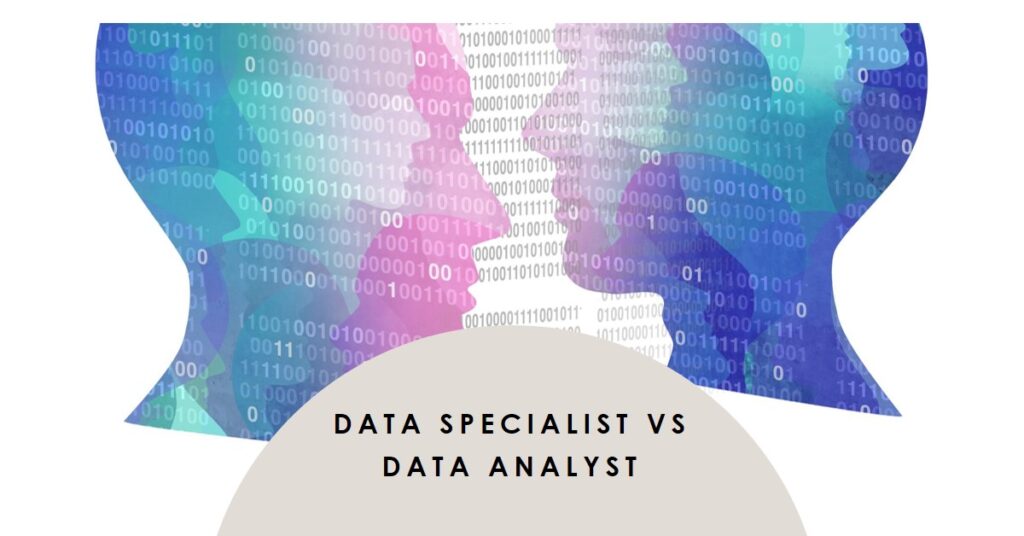- Introduction: Understanding the Difference between a Data Specialist and a Data Analyst
- What is a Data Specialist?
- What is a Data Analyst?
- Differences Between a Data Specialist and a Data Analyst
- Conclusion: Choosing the Right Role in the Data Industry
- Some Facts About Data Specialist vs Data Analyst, What's The Difference:
-
FAQs about Data Specialist Vs Data Analyst, What'S The Difference
- What is the difference between a Data Specialist and a Data Analyst?
- What are the job duties of a Data Specialist?
- What are the job duties of a Data Analyst?
- What are the job requirements for a Data Specialist?
- What are the job requirements for a Data Analyst?
- What is the work environment like for a Data Specialist and a Data Analyst?
- A data specialist is responsible for managing the technical aspects of data, including data collection, storage, and analysis. They focus on developing and maintaining databases, ensuring data quality and integrity, and implementing data security measures.
- A data analyst, on the other hand, focuses on analyzing and interpreting data to extract actionable insights and support decision-making. They use statistical techniques and data visualization tools to identify trends, patterns, and correlations in the data.
- The main difference between a data specialist vs data analyst is their focus and skill set. While a data specialist is more focused on the technical aspects of data management, a data analyst is more focused on the analysis and interpretation of data to drive insights and decision-making.
Introduction: Understanding the Difference between a Data Specialist and a Data Analyst
Data plays a crucial role in today’s digital world, and professionals who work with data have varying job titles and responsibilities. Understanding the distinction between a data specialist vs data analyst is essential for organizations seeking to leverage their data effectively.
While there may be overlap in skills and tasks, these roles have distinct focuses and require different skill sets.
A data specialist is a professional who is skilled in managing and processing data. They possess expertise in data storage, retrieval, cleansing, and integration. Their role involves designing and maintaining databases, implementing data quality measures, and ensuring data security.
A data specialist may also work on data governance, creating policies and procedures for data management within an organization.
Their main goal is to ensure the accuracy, completeness, and consistency of data.
On the other hand, a data analyst is responsible for extracting insights and meaning from data. They possess strong analytical skills, using statistical techniques and data visualization tools to analyze data sets.
Data analysts identify trends and patterns, perform data modeling, and create reports and dashboards to communicate their findings. These insights help businesses make informed decisions and drive strategic planning. Data analysts also collaborate with other teams, such as marketing or finance, to understand their data needs and provide relevant analysis.
It is important to note that while a data specialist focuses on ensuring data integrity and maintenance, a data analyst focuses on deriving valuable insights from data. While there may be some overlap in skills and tasks, such as data cleansing and integration, the primary objectives of these roles differ.
A data specialist ensures the accuracy and organization of data, while a data analyst focuses on analyzing and interpreting data to drive business decisions.
Pro Tip: To maximize the potential of data within an organization, it is beneficial to have both data specialists and data analysts working together. This collaboration ensures that data is well-managed, accurate, and readily available for analysis, leading to more informed decision-making processes.
What is a Data Specialist?
A Data Specialist is a professional who possesses expertise in handling and analyzing data. With a focus on data management and organization, a Data Specialist ensures the accuracy and integrity of data sets. They possess advanced knowledge of data processing tools and techniques, enabling them to extract valuable insights from complex data sets.
In addition, they are skilled in interpreting and visualizing data, enabling effective decision-making processes.
By leveraging their expertise, Data Specialists play a crucial role in optimizing data-driven strategies and improving business outcomes. Don’t miss out on the opportunity to leverage the expertise of a Data Specialist in unlocking the full potential of your data.
What is a Data Analyst?
Data analysts are professionals who work with large sets of data to uncover patterns, trends, and insights that can be used to inform business decisions. They utilize statistical techniques and data visualization tools to analyze data and present their findings in a clear and concise manner. Data analysts play a crucial role in helping organizations make data-driven decisions, improve efficiency, and gain a competitive advantage in the market. They possess strong quantitative and analytical skills, programming knowledge, and business acumen to translate complex data into actionable insights. In addition, data analysts have a deep understanding of data structures, data manipulation techniques, and database management systems.
Differences Between a Data Specialist and a Data Analyst
There are distinct variations between a data specialist and a data analyst. In terms of their roles and responsibilities, there are key differences that set them apart. Additionally, the required skills and expertise for each position also differ.
Let’s explore these variations further to gain a better understanding of the variations between a data specialist vs data analyst.
| Aspect | Data Specialist | Data Analyst |
|---|---|---|
| Roles and Responsibilities | Focuses on managing and organizing data, developing databases, designing data models, and ensuring data integrity and data security. | Concentrates on analyzing data to extract meaningful insights, identifying trends, and making data-driven recommendations for business decisions. |
| Skills Required | Proficiency in data management, data governance, database administration, SQL, data security, and data modeling. | Expertise in data analysis, statistical analysis, data visualization, programming, SQL, and proficiency in analytical tools and software. |
| Expertise | Specializes in data infrastructure, data engineering, database design, and data architecture. | Specializes in data analytics, data interpretation, data visualization, and deriving actionable insights from data. |
In addition to the information mentioned above, it is important to note that data specialists focus more on the technical aspects of data management and organizing, while data analysts are primarily concerned with uncovering patterns and interpreting the data to support decision-making.
By understanding these nuances, organizations can effectively leverage the skills of both data specialists and data analysts to optimize their data-driven strategies.
To avoid missing out on the benefits that a data specialist and a data analyst can bring to an organization, it is crucial to recognize their unique roles and work collaboratively to utilize their expertise in data management and analysis.
Doing so, businesses can unlock valuable insights that drive informed decision-making and gain a competitive edge in the data-driven landscape.
Conclusion: Choosing the Right Role in the Data Industry
Choosing the Right Role in the Data Industry
When it comes to the data industry, selecting the appropriate role can be crucial for success. Understanding the difference between a data specialist and a data analyst is essential in making this decision. A data specialist focuses on managing and organizing data, ensuring its accuracy and accessibility.
On the other hand, a data analyst is responsible for analyzing and interpreting data to extract valuable insights. By recognizing these distinctions, individuals can make an informed choice that aligns with their skills and interests.
To navigate the data industry effectively, it is important to consider some additional aspects not previously covered. Factors like required technical skills, educational background, and growth opportunities should be taken into account.
Additionally, understanding the specific job responsibilities and day-to-day tasks associated with each role can help individuals determine their suitability. By carefully considering these unique details, aspiring professionals can make an informed decision that aligns with their career goals.
To ensure a successful career in the data industry, there are some suggestions to consider. First, individuals should focus on acquiring the necessary technical skills, such as proficiency in programming languages and data manipulation tools.
Furthermore, gaining practical experience through internships or real-world projects can provide valuable hands-on experience. Lastly, continuous learning and staying updated on the latest industry trends are essential to remain competitive. By following these suggestions, individuals can enhance their chances of finding the right role and achieving success in the data industry.
Some Facts About Data Specialist vs Data Analyst, What’s The Difference:

- ✅ Data Specialists focus on the storage and management of data, while Data Analysts are responsible for interpreting and analyzing data to generate insights.
- ✅ Data Specialists are responsible for developing and implementing data management processes and procedures, while Data Analysts use statistical techniques to identify patterns and trends in data sets.
- ✅ Data Specialists create databases and maintain them, while Data Analysts create data visualizations and reports to help organizations better understand their data.
- ✅ Data Specialists must have a strong background in computer science and engineering, while Data Analysts must have a strong background in mathematics, statistics, and computer science.
- ✅ Data Specialists typically focus on the technical aspects of data, while Data Analysts focus on the analytical aspects of data.
FAQs about Data Specialist Vs Data Analyst, What’S The Difference
What is the difference between a Data Specialist and a Data Analyst?
A Data Specialist is responsible for the storage and management of data, while a Data Analyst focuses on interpreting and analyzing data to generate insights.
What are the job duties of a Data Specialist?
A Data Specialist is responsible for organizing, analyzing, and reporting data within a company. They work with multiple data sources, identify trends and patterns, and create visual reports and dashboards to represent the data. They also develop and implement data management processes and procedures.
What are the job duties of a Data Analyst?
A Data Analyst collects, organizes, and analyzes data to help organizations make informed decisions. They work with various data sources, such as financial records, customer surveys, and market research. They use statistical techniques, like predictive analytics, to identify trends and correlations in data. They then use their findings to inform business decisions and strategies.
What are the job requirements for a Data Specialist?
A Data Specialist must have a strong background in computer science and engineering. They should be proficient in SQL, Python, and other programming languages. They should also have experience with data visualization tools, like Tableau and Power BI.
What are the job requirements for a Data Analyst?
A Data Analyst must have a strong background in mathematics, statistics, and computer science. They should be proficient in data mining and analysis tools, such as R and SAS. They should also have experience with data visualization tools, like Tableau and Power BI.
What is the work environment like for a Data Specialist and a Data Analyst?
Data specialists typically work in an office setting, collaborating with a team of other data specialists. They are responsible for managing and troubleshooting large amounts of data across multiple systems. Data analysts also work in an office setting and collaborate with team members. They focus on analyzing data and providing insights to help organizations make better decisions.

A prominent SEO and Business Analyst with 5+ years of experience helping businesses achieve growth



